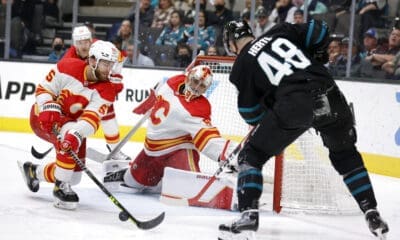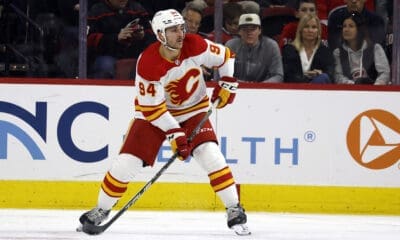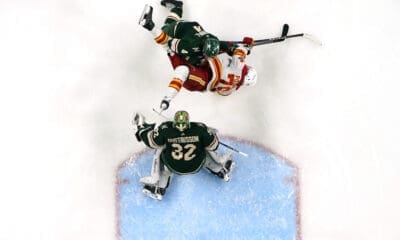Calgary Flames
The morning after: Game 10 fancy stats recap
Downed 3-1, the Flames definitely have several things to work on, but it wasn't a bad effort.
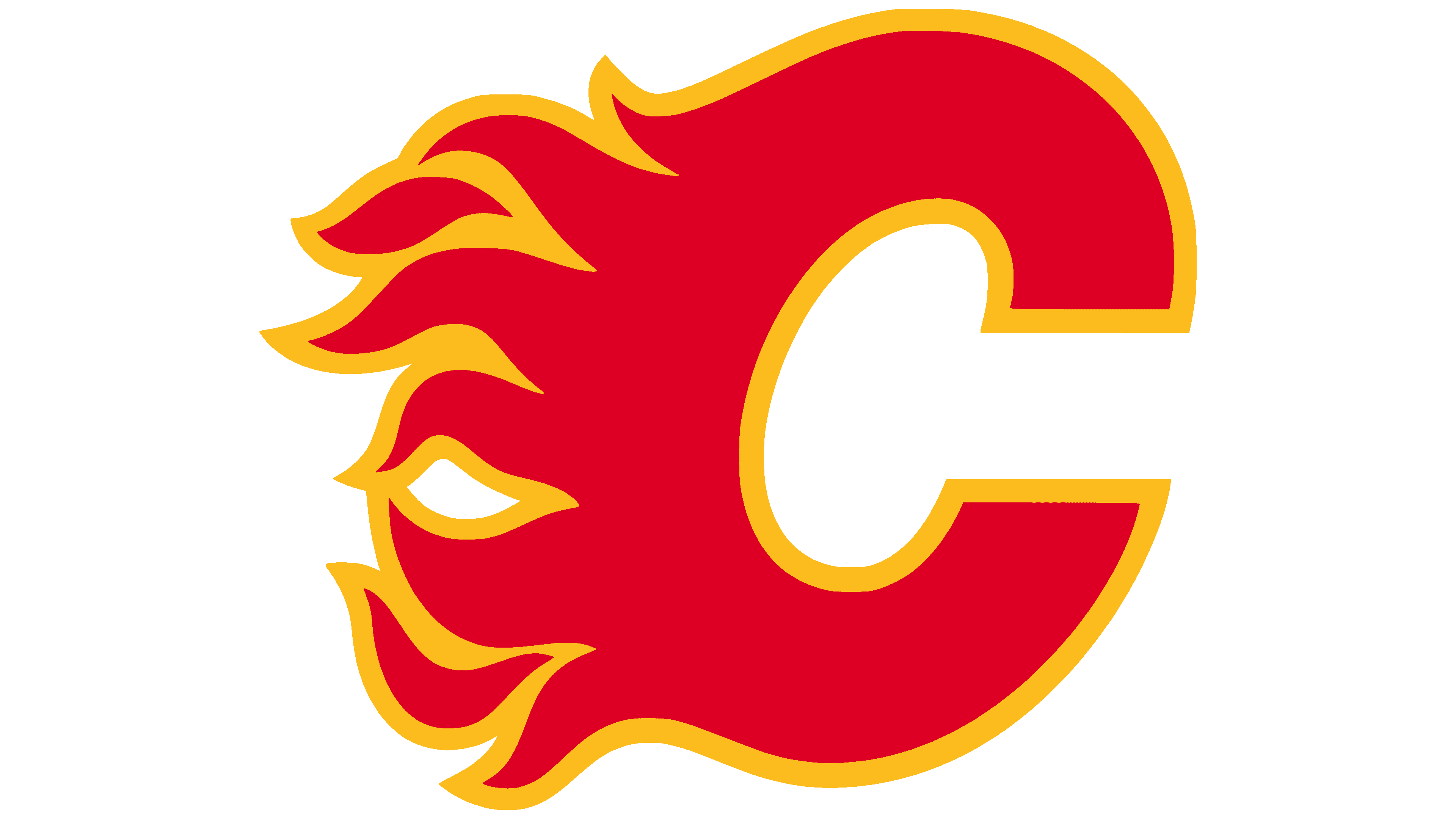
Some teams are simply better than others, and that’s what we saw last night. To the surprise of nobody, the Washington Capitals are a better team than the Calgary Flames, and the Flames didn’t have the benefit of fortuitous bounces or poor goaltending to help them pull ahead in this one. But as the score would indicate, while facing a club of superior talent – and the Caps definitely have that elite level talent that the Flames don’t, at least not yet – the Flames weren’t completely out of it. Just mostly.
The same goes for the shot attempts both clubs exchanged. Once again, Washington was clearly the better team, but the Flames (mostly) didn't roll over and die. Via HockeyStats:
So a couple of times there Calgary was actually out-corsiing Washington, although not by much, and definitely not in the third; a period they played mostly down by two. Looking at it period by period, via NaturalStatTrick:
Flames vs Capitals - All Situations

Flames vs Capitals - Even Strength

Even Strength Corsi Data
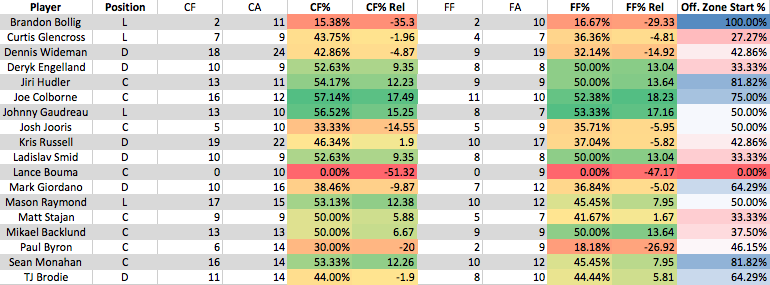
- Lance Bouma had a really rough night. It’s not often you see somebody fail to be on the ice for a single shot attempt, but he managed to do it.
- At least he has some excuse, though: not a single shift started in the offensive zone. The next worst Flame was his linemate, Brandon Bollig, who started all of his shifts in the offensive zone. If “always earned, never given” is actually a thing, then Bollig needs to be sat next game, because between the sheltered minutes, poor possession, and general stupidity he exhibited in the third period, he had an abhorrent game.
- The remaining fourth liner, Josh Jooris, didn’t exactly fare well with what he was given, either, but he was better than his linemates, and he got to play more than them, too.
- This was a bad game for Paul Byron. Early into this season the little guy has shown he can manage tougher minutes and turn them into something positive, but just like his breakaway attempt, it wasn’t working for him last night.
- Linemates Curtis Glencross and Matt Stajan had far better games, considering they were less sheltered and came away with greater possession stats. Even if Glencross was forced to leave the game early. Somehow Stajan played the least of the three of them, although he was putting up a better performance. Again, and it bears repeating until we’re certain it won’t happen again: do not put him on the fourth line, he is better than that.
- Mikael Backlund was the only other forward to really get poor zone starts. He came away with even possession. He didn’t get particularly big minutes, though, even compared to his linemates, and I’m not entirely sure why. Backlund had three shots on net, more than every other Flames forward.
- As for linemates Mason Raymond and Johnny Gaudreau, they received more starts in the offensive zone, and were, consequently, positive possession players. I particularly liked Gaudreau’s game – he had the better of the two – and the stats really match up with the chances he was clearly creating.
- Sean Monahan, Jiri Hudler, and Joe Colborne played the most out of all Flames forwards, and were the most sheltered when it came to zone starts. Then why just decent possession stats? Because they were primarily matched up against the Caps’ top line, Monahan in particular. He’s young, but facing players of Alex Ovechkin and Nicklas Backstrom’s caliber and coming away pretty okay, albeit with a boost, is a good sign. Colborne, also in his sophomore season, saw less of them and did a little better.
- To defence. Deryk Engelland (and this is even strength data, so his horrific turnover leading to Joel Ward’s first goal doesn’t count here) and Ladislav Smid got the worst zone starts, but had the best possession stats. They played the least – about 11 or 12 even strength minutes each – and saw the softest competition the Caps had to offer, so that explains that.
- Kris Russell and Dennis Wideman are the second pairing, although they played about the same amount as the top guys (Russell led the entire team in ice time with 25:00). As the middling pairing, they played the middling competition, and looking at their possession stats, their competition was clearly better.
- Then there’s TJ Brodie and Mark Giordano, who got beneficial zone starts, but – surprise, guess who Ovechkin and Backstrom saw the most of. This, combined with the Monahan line’s beneficial starts, shows Trotz wanted his top guys out there when the puck was closest to the Capitals’ net. And that’s how good the Caps’ best players are: they took the Flames’ best and beat them. That’s why you need elite talent on top of depth. Depth is great, and the Flames look like they’ll have it for the future, but elite talent – the kind you get typically by picking high in the draft – is necessary.
Player Spotlight - Josh Jooris
Elite talent is important, but so is depth, and the ability to roll four lines is becoming increasingly crucial. The Flames seemed to have acknowledged this by not letting Brian McGrattan on the ice if they can help it. Bollig had a junk night, and Bouma was absolutely buried and couldn’t escape it. Jooris had the most respectable performance of the fourth liners, so, let’s take a look at him.
This was the first time in four games the Flames weren’t really able to roll four lines, and the first time in four games they failed to get a point. Tiny sample size, but not entirely coincidental. A strong reason for this is the Caps have more elite talent – Ovechkin and Backstrom in particular – while of their three previous opponents (Jets, Lightning, Hurricanes), the only player you could really describe as elite at this point in time is Steven Stamkos.
It's important to have depth that can match up against that, so as not to exhaust your top lines. It's early yet, but so far, Jooris is looking like he may be able to be a capable depth NHLer. Bollig, on the other hand, does not have a place in the league's future. The Flames have him on contract for three years, and it's their own fault – let's see how long it takes them to realize their error and admit to it.
by Ari Yanover

